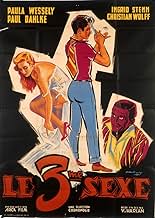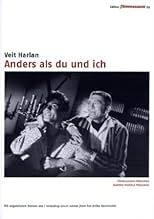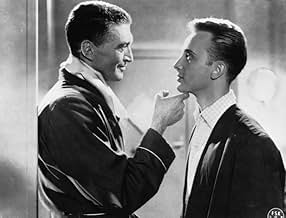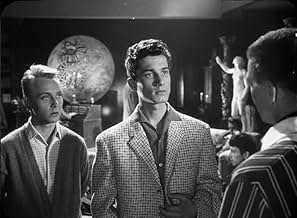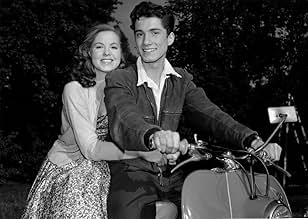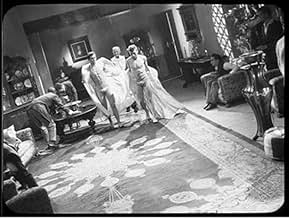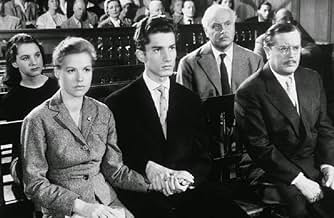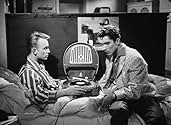Agrega una trama en tu idiomaKlaus is a young man in post-war Berlin. He is drawn to his friend Manfred and, under the encouragement of their acquaintance, Dr. Winkler, explore the underground world of gay clubs and ele... Leer todoKlaus is a young man in post-war Berlin. He is drawn to his friend Manfred and, under the encouragement of their acquaintance, Dr. Winkler, explore the underground world of gay clubs and electronic music. His family begins to learn of his other life and do everything they can to ... Leer todoKlaus is a young man in post-war Berlin. He is drawn to his friend Manfred and, under the encouragement of their acquaintance, Dr. Winkler, explore the underground world of gay clubs and electronic music. His family begins to learn of his other life and do everything they can to set him straight.
- Manfred Glatz
- (as Günther Theil)
- Travestiekünstler
- (as Marcel Andrée)
- Butler Maurice
- (sin créditos)
- Petra Mertens
- (sin créditos)
- Dirección
- Guionistas
- Todo el elenco y el equipo
- Producción, taquilla y más en IMDbPro
Opiniones destacadas
By 1962 when I was about 11 years old, "The Third Sex" was still in the local cinema circuit. I never saw the movie, and I did not even try in adolescence. By then I was more curious about Isabel Sarli's mega-bosom and her adventures in waterfalls and beaches, until the British Protestant boys appeared and seduced us all, with the Beatles and Malcolm McDowell leading hordes of rebels. Nevertheless, the influence of "The Third Sex" lasted everywhere.
The film was made as an argument against the 175 article, which criminalized homosexual acts, even in the privacy and with the consent of the adults involved. However it was mainly used to alert (straight) adults of the "dangers of homosexuality and its vectors", and to give parents, grandparents, great-grandparents and teachers basic instructions on how to "cure" the children of "the plague".
The leading characters are people that "moral majorities" always seem to follow and respect. Members of the petty bourgeoisie, social "wannabes" between being or not being, between having or not having, who go to mass but curse as soon as they exit the church, etcetera... you know them well. The film tells how a "decent" family mother (with the looks of not having sex in more than a decade, judging by the boredom inspired by her banker husband) "saves" her son from the grip of "homosexualism", inducing him to have sex with the maid.
The young man seems quite normal to me, a painter in the making, willing to live "la vida loca", but naïve enough to hang around with men who are either impertinent, foolish and corny, or depraved and corrupt. The wholesome proletarian girl serving the family is the perfect potion, according to mother, a practice that is still common in many homes, behind closed doors. Momma the Witch Doctor goes to trial accused of procuring and before a sentence is pronounced, we watch her story in flashback.
Despite being a piece that did not pass the test of time, «Different from You and Me» is fascinating to see, as not to forget how cruel we humans can be. In short, if we persist on reading only bibles and (disguised) Nazi manifestos to learn about our human essence, we will continue to live on this planet of the apes.
Fortunately the Filmmuseum München (Munich Film Museum) has undertaken the effort to find footage from the original version of the movie, called "Das dritte Geschlecht" ("The 3rd Sex"), and has just released a DVD of "Anders als du und ich" (European PAL, region code 0, German soundtrack with optional English subtitles) which provides the movie not only in stunning technical quality but also with extensive extra features including comparisons of all edited scenes with their original version. And these original scenes are far from homophobic! To give you just one example, in the edited version the lyricist's mother tells the painter's uncle (who joins the father in searching for his son) that she knows her son is gay and that she has learned to accept it, and the man replies that she mustn't accept it. In the original version he simply replies: Well, that's fate. A multitude of more examples prove without doubt that the original intention of the film was remarkably enlightened, and the superb and highly recommended DVD edition even contains a ROM part with documents that explain why the alterations were performed: The "Freiwillige Selbstkontrolle", a German film rating organization comparable to the MPAA, rejected the original version - for "advertising" homosexuality!
To get that straight (sorry for the pun): All this doesn't make Mr Harlan a saint. There are elements in the film that are hard to explain: Why is the art dealer filmed in a sort of demonic light during his all-male soirées? Maybe to parody the society's view on homosexuality? If so this would be a risky approach.
In the end we cannot accuse Mr Harlan of homophobia but certainly of naiveté: He, who always claimed that Goebbels (Hitler's "secretary of propaganda") had not only forced him to shoot "Jud Süß" but also destroyed his own non-antisemitic cut of the film (there are at least clues to support his version of the story) should have been warned that something similar could happen again and that this in conjunction with his reputation would destroy any noble message he may have wanted to communicate.
All in all a highly interesting and truly unique historical document of the situation of homosexuals in Germany very far "before Stonewall".
Harlan soon staged his much-awaited comeback and started making movies in which the word Jew was taboo. Alas, all he was interested in making, were movies inciting hatred. So if you are no longer allowed to openly incite hatred of the Jews --- though soon even that may be allowed again in a unified Germany where the death of thirty thousand Aryans during the bombing of Dresden is nowadays widely viewed as comparable, if not worse, than the wanton genocidal murder of six million Jews--- there is always some other group to pick on.
Not aware that homosexuality was on its way to becoming legal in the land of Roehm, Harlan had decided he would make a gay-hating movie for a change. The story is so inane, that I will forgo any spoilers. What no one can miss though, is the fact that the way the "good Germans" in this movie talk to and about gay men, is a mutatis mutandis quotation of the way they used to talk in Harlan's wartime movies to and about the Jews shortly before murdering them. This does not stop at spoken language but extends to body language as well.
Though the word Jew is never uttered in "Anders als Du und Ich," the movie's openly gay bad guy goes by the certainly non-Aryan name of Dr. Boris Winkler, and his man-servant is known only by his, in Germany most Semitic of surnames, Maurice. I guess the Goebbels boys must have been at it yet again, even though like his child-murdering spouse, the cowardly propaganda minister had swallowed his cyanide more than a decade before the shooting of "Anders als Du und Ich.."
Maybe the most disgusting feature of this movie is the participation of the legendary stage actress Paula Wessely, who had acted in Nazi propaganda movies during the war and then asked to be forgiven for this "lapse". There is no denying that Wesssely was one of the most spellbinding stage actresses of all time. But to participate in a movie in which she is asked to act the role of a mother, who after having heard rumors that her son may be gay, learns all she ever wanted to know about homosexuality, by furtively looking up the one-paragraph entry "Third Sex" in a Hitler-era lexicon, indicates that a very limited intelligence informed Wessely's great acting talent.
¿Sabías que…?
- TriviaWas censored, cut and initially banned upon it's release for tackling, what was considered to be a controversial subject of (then criminalized) homosexuality.
- Versiones alternativasGerman edit is heavily censored; US cut, although shortened, more like the original, director's cut.
Selecciones populares
Detalles
- Tiempo de ejecución1 hora 31 minutos
- Color
- Relación de aspecto
- 1.37 : 1
Contribuir a esta página


